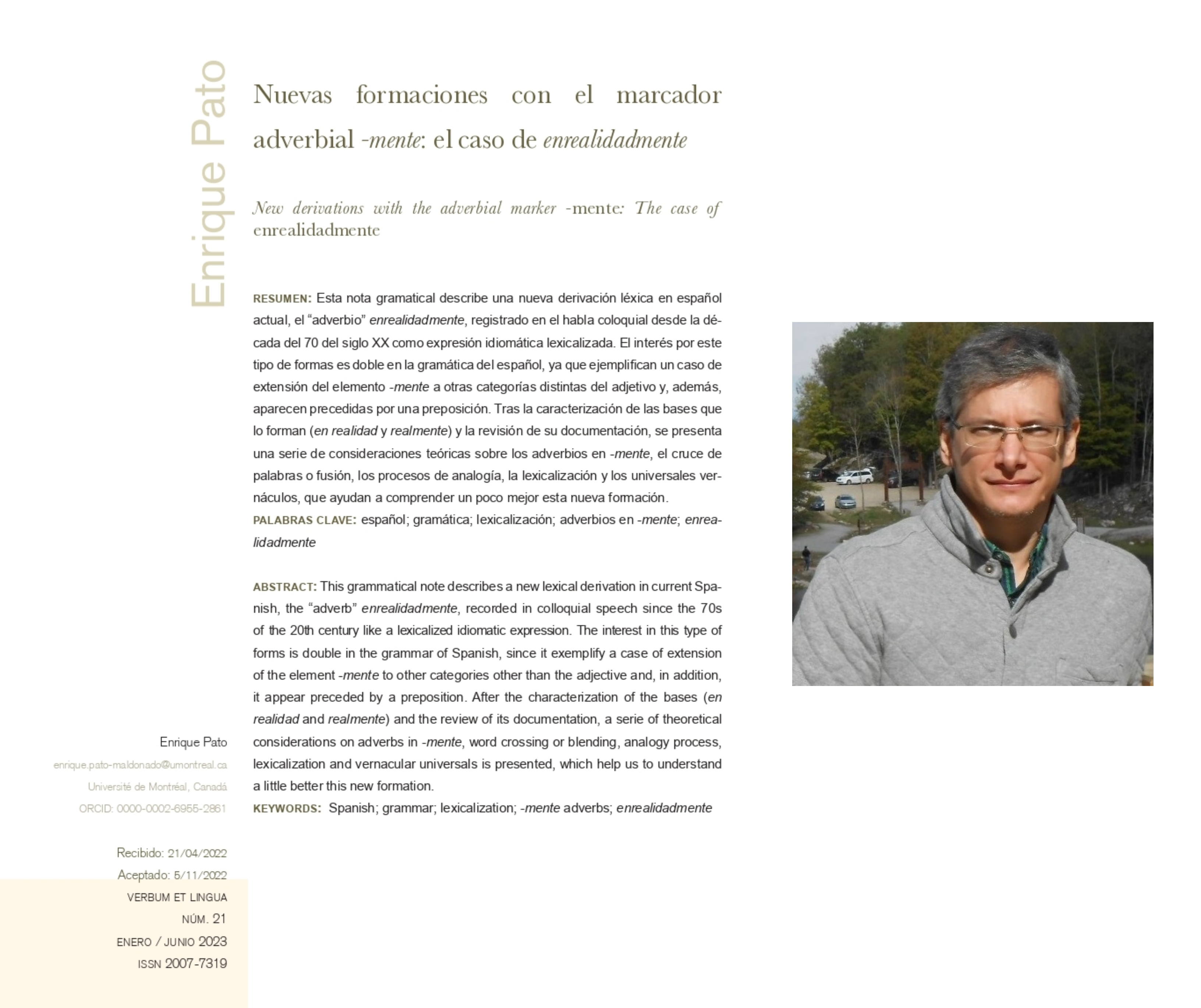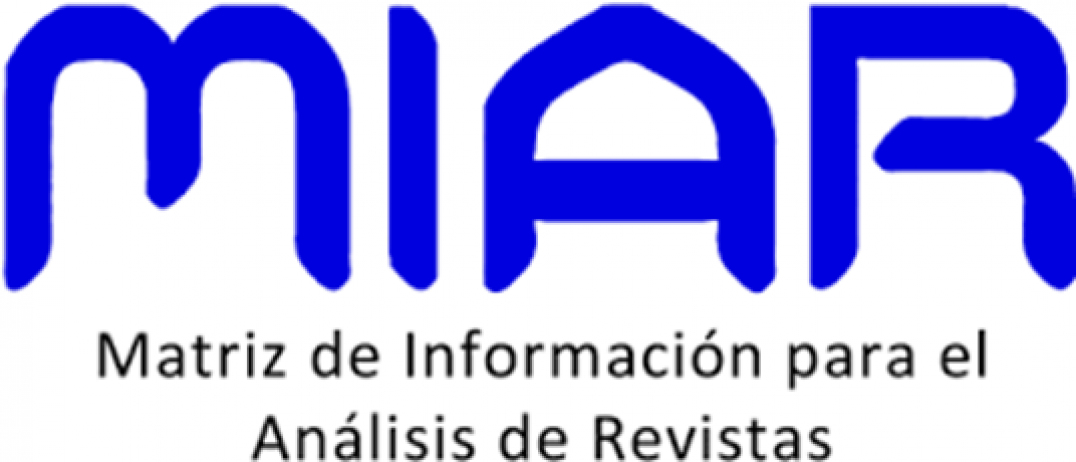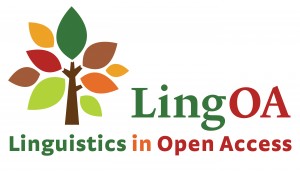New derivations with the adverbial marker -mente: The case of enrealidadmente
DOI:
https://doi.org/10.32870/vel.vi21.188Keywords:
Spanish, grammar, lexicalization, -mente adverbs, enrealidadmenteAbstract
This grammatical note describes a new lexical derivation in current Spanish, the “adverb” enrealidadmente, recorded in colloquial speech since the 70s of the 20th century like a lexicalized idiomatic expression. The interest in this type of forms is double in the grammar of Spanish, since it exemplify a case of extension of the element -mente to other categories other than the adjective and, in addition, it appears preceded by a preposition. After the characterization of the bases (en realidad and realmente) and the review of its documentation, a series of theoretical considerations on adverbs in -mente, word crossing or blending, analogy process, lexicalization and vernacular universals is presented, which help us to understand a little better this new formation.
Downloads
Metrics
References
Almela Pérez, R. (1999). Procedimientos de formación de palabras en español. Barcelona: Ariel.
Bauer, L. (2012). “Blends: Core and periphery”. En V. Renner; F. Maniez; P. J. L. Arnaud (Eds.), Cross-Disciplinary Perspectives on Lexical Blending (pp. 11-22). Berlin: De Gruyter.
Briz, A., Pons, S., Portolés, J. (Coords.) (2008). Diccionario de partículas discursivas del español. Disponible en www.dpde.es.
Caicedo Hernández, B. R. (2019). “Los vicios del lenguaje”. En Guías y talleres de lengua castellana (pp. 1-3). Cúcuta: Institución Educativa Juan Pablo I.
Canes Nápoles, A., Delbecque, N. (2017). En realidad, polisemia y polifuncionalidad de un marcador discursivo. RILI, Revista Internacional de Lingüística Iberoamericana, 1(29), 173-205.
Chambers, J. K. (2004). “Dynamic typology and vernacular universals”. En B. Kortmann (Ed.), Dialectology meets Typology (pp. 127-145). Berlin: De Gruyter.
CORDE. Corpus Diacrónico del Español. Madrid: RAE. Disponible en www.rae.es.
CORPES. Corpus del Español del Siglo XXI. Madrid: RAE. Disponible en www.rae.es.
Corpus del Español, Mark Davies (Dir.), Provo, UT: Brigham Young University. Disponible en www.corpusdelespanol.org.
CREA. Corpus de Referencia del Español Actual. Madrid: RAE. Disponible en www.rae.es.
Di Tullio, Á., Pato, E. (Eds.) (2022). Universales vernáculos en la gramática del español. Madrid/Frankfurt: Iberoamericana/Vervuert.
Dyer, N. J. (1972). A Study of the Old Spanish Adverb in -mente. Hispanic Review, 40(3), 303-308.
Fábregas, A. (2007). Adverbios en -mente y la estructura del adjetivo en español. ELUA, Estudios de Lingüística Universidad de Alicante, 21, 103-124.
Fauconnier, G. (2005). Fusión conceptual y analogía. Cuadernos de Información y Comunicación, 10, 151-182.
Fuentes Rodríguez, C. (2009). Diccionario de conectores y operadores del español. Madrid: Arco/Libros.
Hale, K., Keyser, S. J. (2002). Prolegomenon to a theory of argument structure. Cambridge, MA: MIT Press.
Herrera, J. R. (1976). “Interview no. 221”. En Combined Interviews. El Paso: Institute of Oral History, University of Texas at El Paso.
Kornfeld, L. (2006). Romance adverbs in -mente and the relation morphology-syntax. Comunicación presentada en el 16th Colloquium on Generative Grammar. Madrid: Universidad Autónoma de Madrid (20-22 de abril de 2006).
Kovacci, O. (1999). “El adverbio”. En I. Bosque; V. Demonte (Dirs.), Gramática descriptiva de la lengua española (pp. 705-786). Madrid: Espasa-Calpe.
Labov, W. (1972). Sociolinguistic patterns. Philadelphia: University of Pennsylvania Press.
Martín Zorraquino, M. A., Portolés Lázaro, J. (1999). “Los marcadores del discurso”. En I. Bosque; V. Demonte (Dirs.), Gramática descriptiva de la lengua española (pp. 4051-4214). Madrid: Espasa-Calpe.
Mateu, J. (2005). “Impossible Primitives”. En E. Machery; M. Werning; G. Schurz (Eds.), The Composition of Meaning and Content: Foundational Issues (pp. 213-230). Frankfurt: Ontos Press.
PRESEEA. Corpus del Proyecto para el estudio sociolingüístico del español de España y de América. Alcalá de Henares: Universidad de Alcalá. Disponible en www.preseea.linguas.net.
Real Academia Española y Asociación de Academias de la Lengua Española (2009). Nueva gramática de la lengua española. Madrid: Espasa.
Real Academia Española y Asociación de Academias de la Lengua Española (2014-2022). Diccionario de la lengua española. Edición del Tricentenario. Madrid: Espasa.
Real Academia Española y Asociación de Academias de la Lengua Española (2019). Glosario de términos gramaticales. Salamanca: Ediciones Universidad de Salamanca.
Rini, J. (1999). Exploring the Role of Morphology in the Evolution of Spanish. Amsterdam/Philadelphia: John Benjamins.
Rodríguez González, F. (1989). Los cruces léxicos en el ámbito político-periodístico. Verba, 16, 357-386.
Rodríguez Ramalle, T. M. (2003). La gramática de los adverbios en -mente o cómo explicar maneras, opiniones y actitudes a través de la lengua. Madrid: Publicaciones de la Universidad Autónoma de Madrid.
Szmrecsanyi, B., Kortmann, B. (2009). “Vernacular Universals and Angloversals in a Typological Perspective”. En M. Filppula; J. Klemola; H. Paulasto (Eds.), Vernacular Universals and Language Contacts: Evidence from Varieties of English and Beyond (pp. 33-53). London: Routledge.
Varela Ortega, S. (1990). Fundamentos de morfología. Madrid: Síntesis.
Twitter. Twitter, Inc.: San Francisco. Disponible en twitter.com.

Downloads
Published
Versions
- 2024-08-30 (2)
- 2022-12-01 (1)












